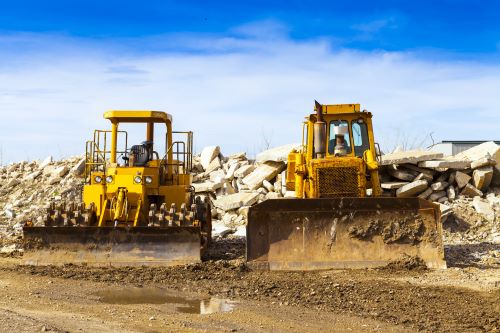
5 Heavy Equipment Questions You’ll Be Ready to Answer After Quality Training

If you’re thinking about enrolling in a heavy equipment operator training program, you may be wondering what you’ll learn. Is it really worth the time and effort? What should you be learning, and how do you know which school to choose? These are all great questions, and we want to answer them for you. After all, one of the most important steps in your career as a heavy equipment operator is choosing the right training program. Here are some of the heavy equipment questions you should be able to answer after completing a quality training course.
How do I operate heavy equipment?
If you’re interested in becoming a heavy equipment operator, you’ll certainly need to become skilled in operating heavy equipment. That may seem like a fairly straightforward question to have answered, but you’d be surprised. Some schools have large class sizes and limited pieces of equipment to be shared among their many students.
That’s why West Coast Training limits its class sizes to just 12 students. This ensures you get plenty of time and individualized attention with the instructor and each piece of equipment. Getting in the maximum number of reps is the best way to ensure you master the skills needed to become a heavy equipment operator. At West Coast Training, you’ll learn to work with backhoes, dozers, graders, excavators, loaders, and many other types of field equipment.
How do I operate heavy equipment safely?
Another heavy equipment question you’ll want answered is how to operate the machinery safely and effectively. Safety is of the utmost importance in our line of work, and that’s why it should be a top priority for any training program. At West Coast Training, you can expect to learn ASME standards, as well as OSHA regulations. All field training is also performed under the close supervision of NCCER-certified instructors.
Students are expected to follow all safety procedures, including equipment inspections, prior to and while operating heavy equipment. This gets future operators into the habit of practicing in the classroom the same techniques they apply once they’re in the workforce. Students will also learn preventative maintenance and other important skills to optimize safety when working in the field.
What is life like in the field?
A quality training program will offer classroom instruction with practical, real-world applications. In order to give you that level of experience, West Coast Training splits instruction time between the classroom and practicing in the field. Getting hands-on experience is the best way to know what to expect once you graduate from your training program and begin your career as a heavy equipment operator.
To that extent, at West Coast Training, you’ll daily spend five hours each in the classroom and in the field Mondays through Thursdays. On Fridays, you’ll spend the entire day out in the field to ensure you are able to apply the skills you’re learning in the classroom safely and efficiently. Because our field training closely mirrors real-life workplace conditions, we’re confident you’ll be fully prepared to embark on your heavy equipment career after completing our program.
At West Coast Training, you’ll also cross-train and learn other positions so that you can have a deeper understanding of field operations. You’ll be taught to perform related duties that include site preparation, flagging, and grade checking, just to name a few.
A program that fails to prepare you for what life is like in the field is failing to fully prepare you for your future career. That’s why West Coast Training takes great care to make sure you’re adequately trained to operate heavy machinery on a professional level prior to graduating from our program.
How do I read a load chart?
While any quality training program should provide the opportunity for hands-on training, it should emphasize the importance of classroom instruction as well. After all, the only way you’ll learn how to operate heavy machinery safely and effectively is by studying basic civil engineering concepts, workplace safety, and applied mathematics, and learning how to apply those concepts to the field effectively.
One of the necessary skills you’ll need to learn is how to read a load chart properly. Each crane has a load chart that shows its lift capacity based on distance and angle. You’ll need to learn how to interpret a load chart prior to operating any machinery in the field. It’s just one of the skills you’ll need to master. But not to worry. We’ll get you ready in the classroom with everything you need to know to operate heavy equipment safely and confidently as part of an actual project crew.
How do I become certified?
Once you’ve spent the time and effort acquiring the necessary classroom instruction and field training skills, a quality program should streamline the certification process. West Coast Training makes the certification process exceptionally easy. We have the distinction of being an approved NCCER testing facility, so we’re able to offer on-site certification exams. At West Coast Training, the first written and practical NCCER examinations are administered free of charge as part of your training program. You’ll complete your NCCER exams during the last week of your training course.
When you enroll at West Coast Training, we’ll answer all the heavy equipment questions you need to know to embark on your new career. We equip you with the requisite skills, not only to acquire your credentials, but to perform your job at the top of the field. Our instructors have years of experience, and they’re eager to impart their knowledge to the next generation of heavy equipment professionals. Could that be you? Take our HEO Career Training Readiness Quiz to find out! We’re ready to help you start building your career now.
